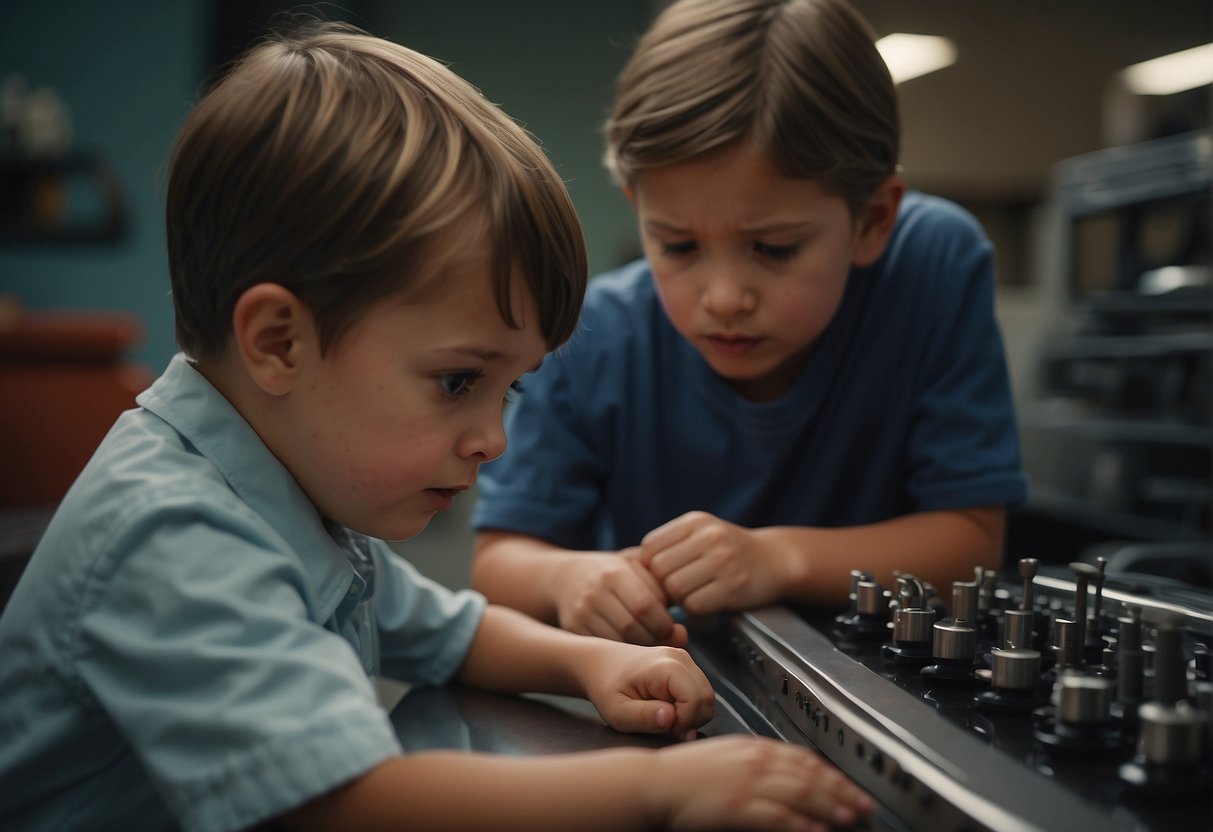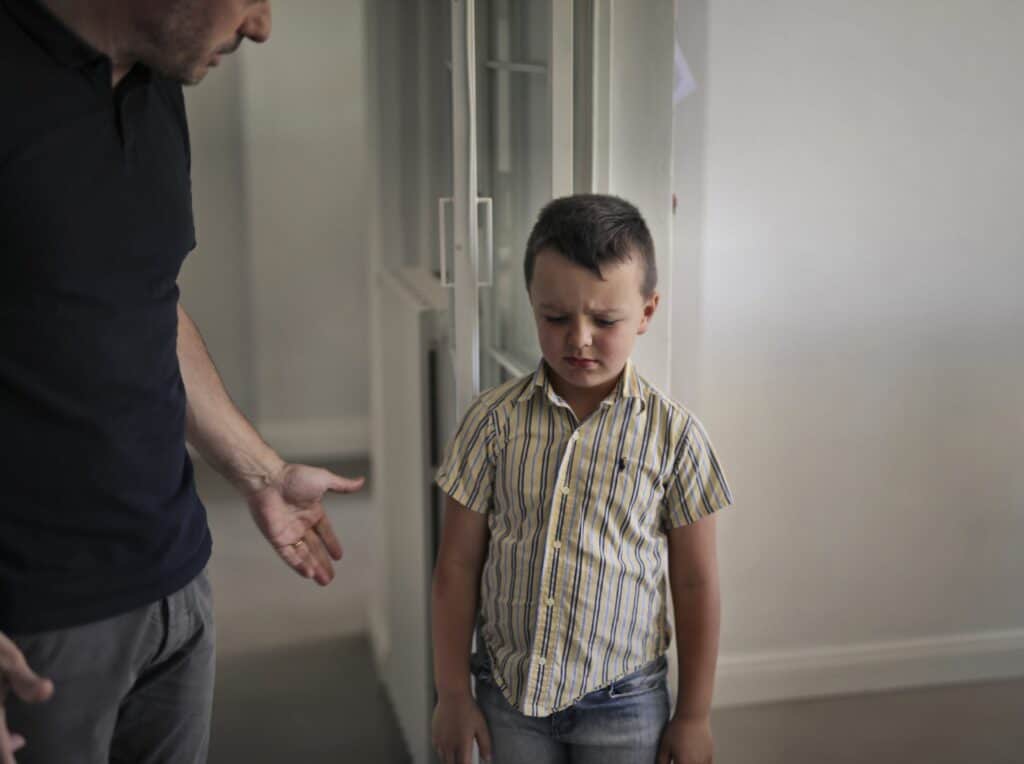When young children become preoccupied with their private parts, it can be a cause of concern for parents and caregivers. While it is normal for children to be curious about their bodies, it can be difficult to determine when this curiosity crosses the line into obsessive behavior. Understanding childhood curiosity and effective communication strategies can help parents address this issue and promote healthy sexual development.
It is important to recognize that children’s interest in their private parts is a normal part of their development. However, if a child becomes preoccupied with their genitals or engages in repetitive or compulsive behaviors related to their private parts, it may be a sign of a more serious issue. Parents should be aware of the signs of abuse and take steps to prevent it, while also addressing obsessive behaviors in a sensitive and age-appropriate manner.
Key Takeaways
- Childhood curiosity about private parts is normal, but obsessive behaviors should be addressed.
- Effective communication strategies can help parents promote healthy sexual development and prevent abuse.
- Recognizing the signs of abuse and addressing obsessive behaviors in a sensitive manner are important for parents and caregivers.
Understanding Childhood Curiosity

Children are naturally curious, and this curiosity extends to their bodies and private areas. It is important for parents and caregivers to understand and acknowledge this curiosity while still maintaining appropriate boundaries and safety measures.
Natural Development and Exploration
It is normal for children between the ages of three to six to exhibit a range of “sexual” behaviors, including exploring their own bodies and showing interest in the bodies of others. This behavior is a natural part of healthy development and should not be cause for alarm.
During this stage, children are learning about their bodies and how they function. They are also learning about the differences between boys and girls, and may be curious about the private areas of others. It is important for parents and caregivers to provide age-appropriate education and information about bodies and boundaries.
Differentiating Between Safe and Unsafe Behaviors
While curiosity about private areas is normal, it is important to differentiate between safe and unsafe behaviors. Children should be taught that their private areas are just that – private – and that it is not appropriate for others to touch or look at them without their permission.
Parents and caregivers should also be aware of signs that a child’s curiosity has crossed into unsafe territory, such as touching others inappropriately or attempting to engage in sexual acts. If such behavior is observed, it is important to seek professional help and support.
By understanding and acknowledging childhood curiosity about private areas, parents and caregivers can provide a safe and healthy environment for children to explore and learn about their bodies.
Effective Communication Strategies
Parents of a 6-year-old who is obsessed with their private parts may feel uncomfortable or unsure about how to address the situation. However, open and honest communication is key to helping the child understand appropriate behavior and boundaries.
Talking About Private Parts
It is important for parents to use proper anatomical terms when talking to their child about private parts. Using nicknames or euphemisms can be confusing and may make the child feel ashamed or embarrassed about their body. By using correct terminology, parents can help their child develop a healthy vocabulary and a better understanding of their body.
When discussing private parts, parents should also emphasize the importance of privacy and respect. Children need to understand that their private parts are meant to be kept private and that no one has the right to touch them without their permission. Parents should encourage their child to speak up if someone tries to touch their private parts or makes them feel uncomfortable.
Setting Boundaries and Privacy Expectations
In addition to talking about private parts, parents should also set clear boundaries and expectations for privacy. This includes establishing rules about who can see the child undressed and where they can change clothes. Parents should also teach their child about appropriate behavior in public and private settings.
It is important for parents to be consistent in enforcing these boundaries and expectations. This can help the child feel safe and secure, knowing that their body is respected and protected. If the child has questions or concerns about their body or behavior, parents should be open to future discussions and continue to provide guidance and support.
Recognizing and Preventing Abuse

Parents and caregivers must be vigilant in recognizing and preventing abuse in children who display an obsession with their private parts. It is important to understand that not all children who exhibit such behavior are victims of sexual abuse, but it is crucial to be aware of the red flags and take appropriate actions.
Identifying Red Flags
While it is normal for young children to be curious about their bodies, there are certain behaviors that may indicate sexual abuse. If a child is showing signs of fear or discomfort when changing clothes or bathing, it may be a red flag. Another red flag is if the child is engaging in inappropriate sexual behavior, such as touching themselves or others in public. If a child is displaying any of these behaviors, it is important to seek guidance from a medical professional or a qualified therapist.
Teaching About Consent and Inappropriate Touching
Parents and caregivers can also play a role in preventing abuse by teaching children about consent and inappropriate touching. It is important to establish guidelines for safe and appropriate behavior and to explain to children what actions are not acceptable. Children should be taught that it is never okay for someone to touch their private parts without their consent and that they should always tell a trusted adult if they feel uncomfortable or shameful about something that has happened to them.
In conclusion, it is important for parents and caregivers to be aware of the red flags and take appropriate actions to prevent sexual abuse in children who display an obsession with their private parts. By teaching children about consent and inappropriate touching, we can help them feel safe and empowered to speak up if something is not right.
Addressing Obsessive Behaviors

When a child shows excessive interest in their private parts, it can be concerning for parents. However, it is important to understand that some level of curiosity and exploration is normal for young children. It is when this interest becomes an obsession that it may be necessary to take action.
When Interest Becomes Obsession
If a child’s interest in their private parts becomes obsessive, it may be a sign of emotional or psychological stress. In some cases, it may also be a sign of sexual abuse. It is important for parents to observe their child’s behavior and determine if the interest is excessive or compulsive.
If the behavior is excessive, parents can try redirecting their child’s attention to other activities. For example, they can encourage their child to engage in physical activities, such as playing outside or participating in sports. They can also provide their child with toys or games that require their hands to be occupied.
Seeking Professional Guidance
If the behavior persists or becomes more compulsive, parents may need to seek professional guidance. A therapist or doctor can help determine the underlying cause of the behavior and provide appropriate treatment.
Parents should be open and honest with their child’s doctor or therapist about their concerns. They should also be prepared to answer questions about their child’s behavior, including how long it has been going on and how often it occurs.
In some cases, a doctor may recommend medication to help manage the child’s behavior. However, this should only be used as a last resort and under the guidance of a medical professional.
Overall, it is important for parents to address obsessive behaviors in their child as soon as possible. With the right guidance and support, most children can overcome these behaviors and lead healthy, happy lives.
Promoting Healthy Sexual Development

Parents and caregivers play a crucial role in promoting healthy sexual development in young children. By providing age-appropriate sexual education and navigating peer influences and media exposure, they can help children develop a positive and healthy understanding of their bodies and sexuality.
Age-Appropriate Sexual Education
It is important to provide children with age-appropriate sexual education to help them understand their bodies and the changes they will experience as they grow. This education should include information about body parts, including the penis, vagina, breasts, and vulva, as well as the basics of sexuality.
Books can be a helpful tool in providing sexual education to young children. Parents and caregivers can choose books that are appropriate for their child’s age and level of understanding. Some recommended books for young children include “It’s Not the Stork!” by Robie H. Harris and “Amazing You!” by Dr. Gail Saltz.
Navigating Peer Influences and Media Exposure
Children are often exposed to sexual content through their peers and media. Parents and caregivers can help children navigate these influences by monitoring their media exposure and having open and honest conversations about sexuality.
It is important to teach children about healthy boundaries and consent, and to help them understand that they have the right to say no to unwanted touch or attention. Parents and caregivers can also help children understand that sexuality is a normal and natural part of life, and that they should never feel ashamed or embarrassed about their bodies.
By promoting healthy sexual development in young children, parents and caregivers can help them develop a positive and healthy understanding of their bodies and sexuality, which can have a lifelong impact on their sexual health and well-being.
Frequently Asked Questions

How should parents address a child’s inappropriate touching of peers?
Parents should address inappropriate touching of peers by explaining to their child that it is not okay to touch others without their permission. It is important to teach children about personal boundaries and respect for others’ bodies. If the behavior continues, parents should seek the help of a professional, such as a therapist or pediatrician, to determine the underlying cause and develop a plan to address the behavior.
What developmental behaviors are typical regarding private parts curiosity in young children?
It is common for young children to be curious about their bodies, including their private parts. Children may explore their bodies through touching or looking, and this behavior is a normal part of development. Parents can help their children understand appropriate boundaries by teaching them the correct names for body parts and explaining that certain behaviors are not appropriate in public.
How can I respond to my child’s excessive focus on their own private parts?
Parents should respond to their child’s excessive focus on their own private parts by remaining calm and addressing the behavior in a matter-of-fact manner. It is important to explain to the child that while it is normal to be curious about their body, certain behaviors are not appropriate in public. Parents can also redirect their child’s attention to other activities and encourage them to explore their interests in other areas.
At what age do children typically begin to exhibit curiosity about sexual differences?
Children typically begin to exhibit curiosity about sexual differences around the age of 4 or 5. This curiosity may manifest itself through questions about where babies come from or how they are born. Parents can address these questions in an age-appropriate manner and provide their child with accurate information.
What are appropriate boundaries for siblings exploring their bodies?
Siblings exploring their bodies is a common behavior and is usually harmless. However, it is important to establish appropriate boundaries and explain that certain behaviors are not appropriate in public. Parents can also encourage their children to explore their interests in other areas and provide them with opportunities to engage in activities together that do not involve exploring their bodies.
How do I distinguish between normal curiosity and problematic behavior concerning private parts in children?
It can be difficult to distinguish between normal curiosity and problematic behavior concerning private parts in children. However, if the behavior is excessive, interferes with the child’s daily life, or makes others uncomfortable, it may be problematic. Parents should seek the help of a professional, such as a therapist or pediatrician, to determine the underlying cause and develop a plan to address the behavior.

My name is Laura, and as a mother of two, I understand firsthand the joys and challenges of raising a child. That’s why I created this website, to provide a comprehensive and trustworthy source of information and support for new and expectant parents.

